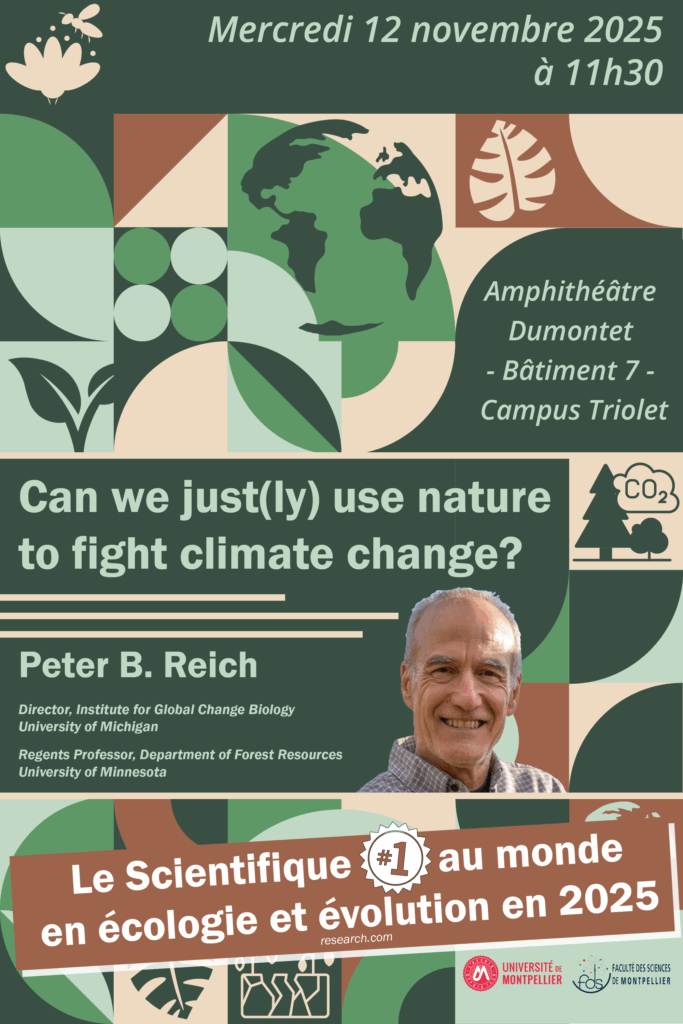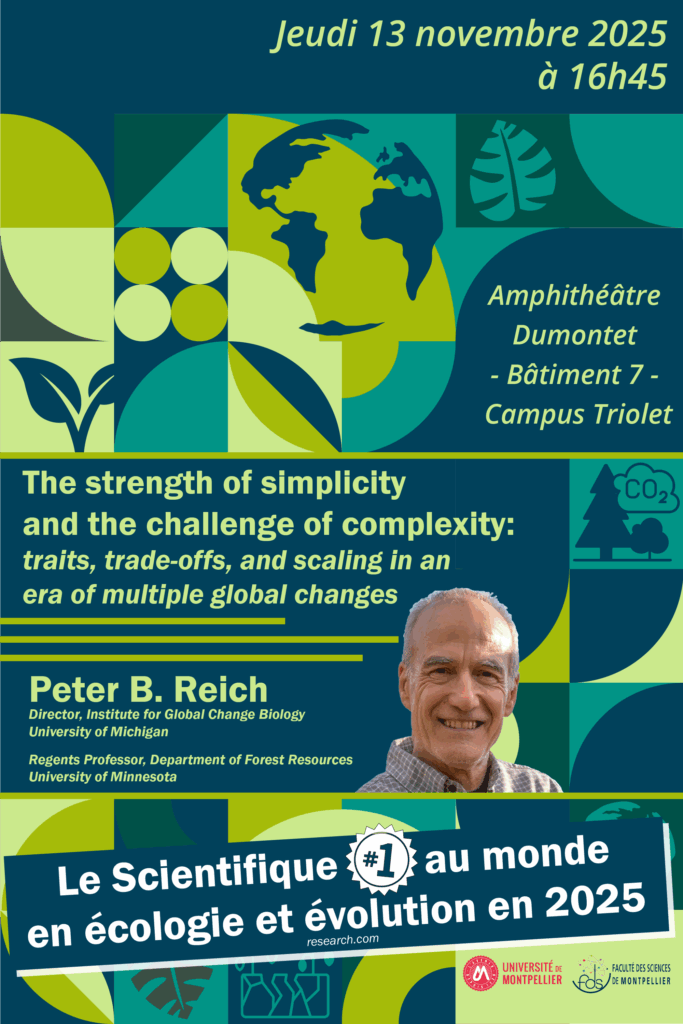12 et 13 novembre : Conférences – Changement Globaux de Peter Reich
La Faculté des Sciences à le plaisir de recevoir Peter B. Reich, expert reconnu en physiologie et en écologie. Il tiendra deux conférences, en anglais, sur notre campus, le 12 et 13 novembre 2025 dans l’amphithéâtre Dumontet.
Peter B. Reich est directeur de l’Institute for Global Change Biology de l’Université du Michigan et professeur au Department of Forest Resources de l’University of Minnesota.
Il a mené des recherches sur les changements globaux touchant les plantes, les sols et les écosystèmes à différentes échelles.
Il a également contribué au lancement de la chaîne d’éducation scientifique MinuteEarth, qui cumule plus de 500 millions de vues sur YouTube et d’autres plateformes.
Une table ronde sur inscription se tiendra également le mercredi 12 novembre de 15h à 16h en amphi 36.05 et sera suivie d’une pause café.
Conférence « Can we just(ly) use nature to fight climate change? » – 12 novembre 2025
Résumé de la conférence (en anglais) : Can we just(ly) use nature to fight climate change?
Terrestrial plants and soils house more than three times as much carbon as is found in the atmosphere, and at least 250x as much carbon as is released each year in fossil fuel burning. Moreover, terrestrial ecosystems – i.e. forests, savannas and grasslands – have already absorbed more than 25% of all the CO2 pollution we’ve put into the atmosphere over recent centuries, and along with the oceans, have slowed climate warming by more than half. That is an ecosystem service by nature worth literally quadrillions of dollars, and is the reason terrestrial carbon sequestration is among the key mechanisms considered part of a strategy we can deploy to slow and stop climate change.
So it is no surprise that scientists, policy-makers, and entrepreneurs all hope that by modifying how and where we manage vegetation and soils, we can encourage nature to absorb a lot more atmospheric carbon and hold on to it in plants and soils. A wide variety of nature-based solutions that might enhance carbon storage in forests, grasslands or agricultural systems have been proposed – some have social justice and biodiversity benefits too (some don’t). Although the devil is always in the details, it is true that there is substantial capacity for nature to ‘hold’ more carbon and for biodiversity to contribute to that. For example, as I will present during my talk, forests alone (excluding forests converted to urban or agricultural use) could in theory house additional carbon equivalent to half of the amount of carbon we will emit in fossil fuel burning in the next four to five decades. Savannas, grasslands, and agricultural lands could also house yet additional carbon.
However, figuring out how to make substantial use of these natural ‘tools’ will be an enormous challenge, given myriad political, economic, ecological, climate, social, and cultural barriers. Ignoring such hurdles means attempts to do so will be far less effective than they might otherwise be. And recognizing such hurdles does not diminish our need to deploy nature as a climate-change fighting tool. Instead, by facing the reality of our challenges we could potentially make good use of nature’s capacities to clean up after us, yet again. If we combine the increased acquisition and storage of carbon on land with just decarbonization via increased energy efficiency, reliance on renewable energy, and electrification, we can slow and stop climate change (and save a boatland of money) by mid-century.
Justly and too late, yet just in time.
Conférence « The strenght of simplicity and the challenge of complexicity » 13 novembre 2025
Résumé de la conférence (en anglais) : The strength of simplicity and the challenge of complexity: traits, trade-offs, and scaling in an era of multiple global changes
Understanding and stewarding nature is our collective challenge. Will ecosystems maintain their biodiversity and function in the face of global environmental change, and continue to sequester carbon and slow climate change? Can traits simplify the complexity of ecology enough that we can make predictable sense of it? Addressing such questions is hard for a single site – how can we generalize about and quantify such processes at regional and global scales?
Figuring out how diverse ecosystems will respond to multi-factorial global change (climate change, land use, biodiversity loss, etc.) is difficult – due to uncertainty about generality of behavior and scaling among taxa, ecosystems, and biomes; and weak understanding of complex interactions, including plant-soil feedbacks. To help address these issues I engage in studies at scales from leaf to globe and on topics from ecophysiology to community assembly to biogeochemistry. This work ranges from identification of global trait-tradeoff and metabolic response functions; to ecosystem-scale experiments with factors such as CO2, temperature, rainfall, fire and biodiversity; to cross-continental observations and earth system modeling. Using examples from diverse ecosystems – including boreal forest, temperate grassland, and tropical savanna – I will show how framing research around fundamental hypotheses about complex issues, and how they scale across hierarchies, space and time, can help uncover both predictable general patterns and unexpected surprises.
TABLE RONDE – PETER REICH
Une table ronde sur inscription se tiendra également le mercredi 12 novembre de 15h à 16h en amphi 36.05 et sera suivie d’une pause café.

